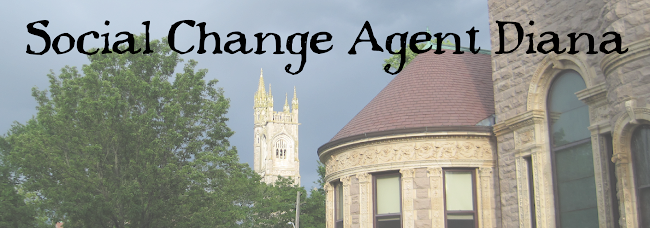I'm in the middle of writing a grant that stresses structural change. It is helping me to outline and synthesize my work as a VISTA at my project site.
As I look at what we do on the side of human development, I now find myself looking at what our job is on the structural side. Sure, working with individuals and training groups is fine and dandy and one way to effect change. But when we call ourselves an "employment initiative" I think I am missing an opportunity to be the social change agent I hold back on. I need to be wicked; I need to be rebellious.
One of the parts of our work is to be the voice of poverty on the development corporation committee. But we don't always take the opportunity to be the real voice. I know they are making mistakes, but I'm afraid to point them out. I need to not shake in the face of power like I do sometimes. But to be that radical, the voice from the distance at times, I fear I will be "unprofessional." I think I need to re-frame this as being "non-traditional" or "unconventional" because that is what we need. Nothing annoys me more than yes-men who shake their heads without pushing for understanding. Communication is a burden and takes so much time. But time is much more valuable than money when you are solving a problem.
I shouldn't be afraid to dominate a conversation when I have something valuable to say. But I am. I'm a woman, I'm young, I'm not informed in "their way" [business] which is the blessing and the curse.
What if I did rant against the machine when I am at the machine. I am not in the machine, I am meeting the machine. Do I have the confidence to throw a wrench in the machine because I'm the only one who understands it is a monster?
I don't know, but I appreciate the opportunity to synthesize my projects in this grant and ask these questions. Not bad for something to do on a Monday.
ICYMI: Abortion backlash makes Republicans sad, jury selection has Trump
super mad
-
*The Day 3 drama of Trump’s New York trial*
Soooooooo much drama.
*Jury selection forces Trump to face people who don't worship him*
How we love to see ...






